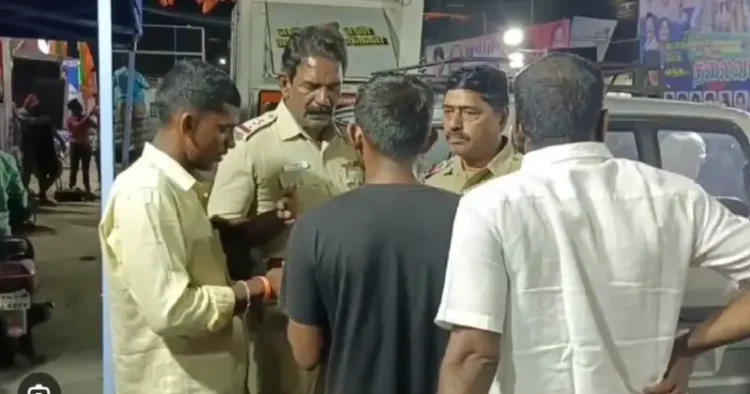In a recent development, two police officials, Sub-inspector K Rajendran and special Sub-inspector A Karthikeyan, faced suspension over alleged violations related to Bharatiya Janata Party (BJP) membership. The incident occurred on December 27th when the officials, donning their service uniforms, visited the BJP’s membership drive camp during BJP leader Annamalai’s visit to Nagapattinam.
Upon a video-based inquiry, SP Harsh Singh ordered a detailed investigation. The officials denied giving a missed call to join the BJP but refused to submit their mobile phones for verification. Following the inquiry, the report was forwarded to DIG T Jayachandran, who, on December 29th, placed them under suspension for allegedly enrolling in the party and violating TN Subordinate Police Officers Conduct Rules 1964.
As this incident unfolds, it echoes previous cases where police personnel expressing interest in the BJP or affiliated groups faced disciplinary action. Head Constable Suresh from Ambathurai police station in Dindigul district was suspended for sharing pro-RSS and BJP content on his Facebook page. Cybercrime officials, acting on a complaint, verified the content and suspended him accordingly.
In another case, Inspector P Rajendran from the Pulianthope Traffic Investigation Wing faced suspension due to controversial remarks on Christianity and Islam. Rajendran, suspended in August of the previous year, allegedly recorded deprecatory comments and shared them in a WhatsApp group. His comments included sentiments like, “This is India; we demolished the mosque in the Rama Janma Bhoomi, and we are building a temple. Indians will worship at temples, conduct pujas; we will get Senghol at the Parliament.”
These incidents raise questions about the balance between individual freedoms, political affiliations, and professional conduct within the police force. While political neutrality is a fundamental expectation from law enforcement, instances of disciplinary actions against officers expressing political views suggest ongoing challenges in maintaining this balance.
TN BJP President Annamalai condemned the suspension of the two police officials, emphasising their right to political affiliations. However, the inquiry into their alleged enrollment in the BJP remains ongoing, and further actions will be determined based on its findings.
In Tamil Nadu, recent incidents involving police personnel have stirred debates on political neutrality within the force. Inspector Rajendran from the Pulianthope Traffic Police faced suspension following controversial remarks, while Inspector Shanmugam and Special Branch Constable Meyyazhalagan were transferred for removing banners with derogatory comments on Hinduism.
The suspension of Inspector Rajendran came after he allegedly made deprecatory comments on Christianity and Islam in a WhatsApp group. Following the video’s widespread circulation, Police Commissioner Sandeep Rai Rathore initiated an investigation, leading to Rajendran’s suspension. The move has sparked discussions on the balance between individual freedoms, freedom of expression, and professional conduct within the police force.
In another incident, Inspector Shanmugam and Constable Meyyazhalagan were transferred for removing banners with derogatory comments on Hinduism at a book fair in Erode. Hindu Munnani, a Hindu nationalist organization, criticized the Tamil Nadu government’s decision, emphasizing that Sri Rama is not just a religious figure but an identity of the country.
The organization released a statement questioning the government’s selective actions, citing the case of IAS officer Uma Shankar, involved in evangelical activities and peddling superstitions, who has not faced similar consequences.
Meanwhile, the Supreme Court collegium strongly recommended Chennai-based advocate R John Sathyan as a judge in the Madras High Court. Despite objections raised by the Centre over his social media posts critical of Prime Minister Narendra Modi, the collegium dismissed concerns, stating that the posts would not impinge on Sathyan’s suitability, character, or integrity.
The broader context reveals a pattern of selective actions by the police force in Tamil Nadu, particularly against individuals critical of the ruling DMK government. Numerous instances have been cited where police arrested BJP and Sangh Parivar members for social media posts critical of the DMK government, while overlooking obscene and threatening comments made by DMK and allied leaders.
The safety of police personnel in Tamil Nadu has also been a concern. Incidents, including the assault of a woman police inspector inside a temple and the molestation of a woman police constable during a public meeting attended by DMK MPs, have raised questions about the working environment and safety for officers.
In response to these developments, a growing number of retired police officials are reportedly joining the BJP, aligning with the party’s goal of forming a government in Tamil Nadu in the 2026 assembly elections. The move aims to strengthen the BJP’s position in the Dravidian political landscape.
As Tamil Nadu continues to grapple with issues surrounding political neutrality within its police force, the incidents have underscored the challenges of maintaining a balance between individual freedoms, political affiliations, and professional responsibilities within law enforcement agencies. The debate prompts a critical examination of the broader implications for democratic norms and governance within the state.
These cases underscore the evolving dynamics within the police force, where issues related to political affiliations and expressions of personal views are increasingly scrutinised. The intersection of political beliefs, social media activities, and professional responsibilities continues to be a complex area requiring careful consideration of individual rights and organisational expectations.



















Comments